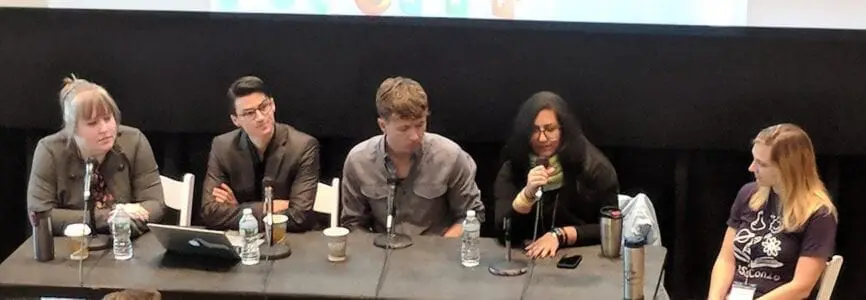Hastings Center News
National Workshop on Science Communication Features Hastings Scholar
What are the right and wrong ways to speak about disability? Joel Michael Reynolds The Hastings Center’s Rice Family Postdoctoral Fellow in Bioethics and the Humanities, was an invited speaker on a science ethics panel at the 2018 Communication Science National Workshop in Boston, where he helped budding scientists and science journalists understand the nuances of discussing disability.
Communicating Science, or ComSciCon, is an annual workshop for graduate students focused on improving science communication to both scientific and general audiences. It is sponsored by several academic and professional organizations, including Harvard University and MIT.
For anyone working in fields related to the life sciences, and especially those that seek to understand human bodies, one of the most important distinctions is between a disability and an illness, says Reynolds. Science communicators must be careful not to conflate these terms, a mistake that Reynolds called “ableist conflation.”
Scientists should be mindful about “finding cures”. Disabled shouldn’t be conflated with diseased. What do those populations actually want & need to be best served & maintain health? Interesting commentary by @joelmreynolds #comscicon18
— Alyson Warr (@alysonwarr) June 15, 2018
“Of course, there are indeed some disabilities that involve suffering, are a result of disease, or lead to death: for example, Tay-Sachs, fibromyalgia, and any conditions involving chronic pain,” Reynolds said. “There are others that don’t. For example, deafness, many types of atypical limb formation, blindness, etc. The point is that this distinction is crucial and the ableist conflation, as a baseline assumption, is wrong.”
Reynolds spoke about a variety of additional topics during his participation at the workshop, including the need for interdisciplinary collaboration between the sciences and the humanities.
“Different approaches produce different types of knowledge” @joelmreynolds emphasizing the need for the humanities and sciences to not work in silos and rethink the way we have structured our education systems #ComSciCon18
— Rackeb Tesfaye (@RackebT) June 15, 2018

